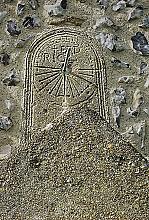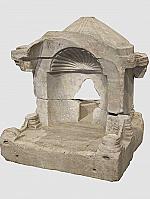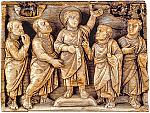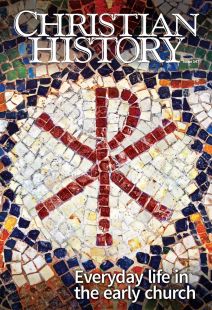“Blessings out of number”

[St John Chrysostom (fresco)—© Giuliano Valsecchi / Bridgeman Images]
If you have a mind to give dinners, and to make entertainments, let there be nothing immodest, nothing disorderly. If you should find any poor saint able to bless your house, able only just by setting his foot in it to bring in the whole blessing of God, invite him. . . .
Let no one of you make it his endeavor to marry a rich woman, but much rather a poor one. When she comes in, she will not bring so great a source of pleasure from her riches, as she will annoyance from her taunts, from her demanding more than she brought, from her insolence, her extravagance, her vexatious [i.e., annoying] language. . . .
For just as with a general, when his troops also are well organized, the enemy has no quarter to attack; so, I say, is it also here: when husband and wife and children and servants are all interested in the same things, great is the harmony of the house. . . .
Excellence of soul
Let us then be very thoughtful both for our wives, and children, and servants; knowing that we shall thus be establishing for ourselves an easy government, and shall have our accounts with them gentle and lenient, and say, “Behold I, and the children which God has given me” (Isa. 8:18).
If the husband command respect, and the head be honorable, then will the rest of the body sustain no violence. Now what is the wife’s fitting behavior, and what the husband’s, [Paul] states accurately, charging [the wife] to reverence [the husband] as the head, and him to love her as a wife. . . . [These things] will be so, if we will despise money, if we will look but to one thing only, excellence of soul, if we will keep the fear of God before our eyes. . . .
Show her too, that you set a high value on her company, and that you are more desirous to be at home for her sake, than in the market-place. And esteem her before all your friends, and above the children that are born of her, and let these very children be beloved by you for her sake. . . .
Condemn . . . all riches and extravagance, and gently point out the ornament [i.e., beauty] that there is in neatness and in modesty; and be continually teaching her the things that are profitable. . . .
Never call [your wife] simply by her name, but with terms of endearment, with honor, with much love. Honor her, and she will not need honor from others; she will not want the glory that comes from others, if she enjoys that which comes from you. Prefer her before all, on every account, both for her beauty and her discernment, and praise her. You will thus persuade her to give heed to none that are outside, but to scorn all the world except yourself.
Teach her the fear of God, and all good things will flow from this as from a fountain, and the house will be full of 10,000 blessings. If we seek the things that are incorruptible, these corruptible things will follow.
For, says He, seek first His kingdom, and all these things shall be added unto you (Matt. 6:33). What sort of persons, think you, must the children of such parents be? What [will] the servants of such masters [be like]? What [will] all others who come near them [be like]? Will not they too eventually be loaded with blessings out of number?
—From “Homily 20 on Ephesians”
By Chrysostom
[Christian History originally published this article in Christian History Issue #147 in 2023]
Chrysostom. Translated by Gross Alexander. From Nicene and Post-Nicene Fathers, First Series, Vol. 13.Next articles
Christian History timeline: Everyday life in the early church
Some of the events shaping this issue in context
the editorsServing the true Lord and God
Why Christians presented such a huge challenge to the Roman state
George KalantzisSupport us
Christian History Institute (CHI) is a non-profit Pennsylvania corporation founded in 1982. Your donations support the continuation of this ministry
Donate







